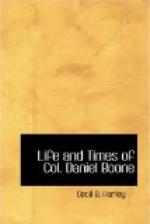’If the white people went into their country, the same consequences followed. The parties were yet highly exasperated against each other; they had not cooled since the peace, if peace it could be called; and meet where they would, bloodshed was the result.’
“Whether the Indians to the north and west had ascertained, or not, that the two expeditions of this year were with or without the consent of Congress, they could but think the treaties vain things; and either made by those who had no right to make them, or no power to enforce them. With Kentuckians, it was known that the latter was the fact. To the Indians, the consequence was the same. They knew to a certainty, that the British had not surrendered the posts on the lakes—that it was from them they received their supplies; that they had been deceived, as to the United States getting the posts, and they were easily persuaded to believe, that these posts would not be transferred; and that in truth, the British, not the United States, had been the conquerors in the late war.”
“Such were the reflections which the state of facts would have justified, and at the same time have disposed them for war. The invasion of their country by two powerful armies from Kentucky, could leave no doubt of a disposition equally hostile on her part Congress, utterly destitute of the means for enforcing the treaties, either on the one side or the other, stood aloof, ruminating on the inexhaustible abundance of her own want of resources—and the abuse of herself for not possessing them.”
After this year, we hear of but few independent expeditions from Kentucky. Their militia were often called out to operate with the United States troops, and in Wayne’s campaign were of much service; but this belongs to the general history of the United States. All that we have to relate of Kentucky now, is a series of predatory attacks by the Indians, varied occasionally by a spirited reprisal by a small party of whites. It is estimated that fifteen hundred persons were either killed or made prisoners in Kentucky after the year 1783.
“On the night of the 11th of April, 1787,” says McClung, “the house of a widow, in Bourbon County, became the scene of an adventure which we think deserves to be related. She occupied what is generally called a double cabin, in a lonely part of the country, one room of which was tenanted by the old lady herself, together with two grown sons, and a widowed daughter, at that time suckling an infant, while the other was occupied by two unmarried daughters, from sixteen to twenty years of age, together with a little girl not more than half grown. The hour was eleven o’clock at night. One of the unmarried daughters was still busily engaged at the loom, but the other members of the family, with the exception of one of the sons, had retired to rest. Some symptoms of an alarming nature had engaged the attention of the young man for an hour before any thing of a decided character took place.




